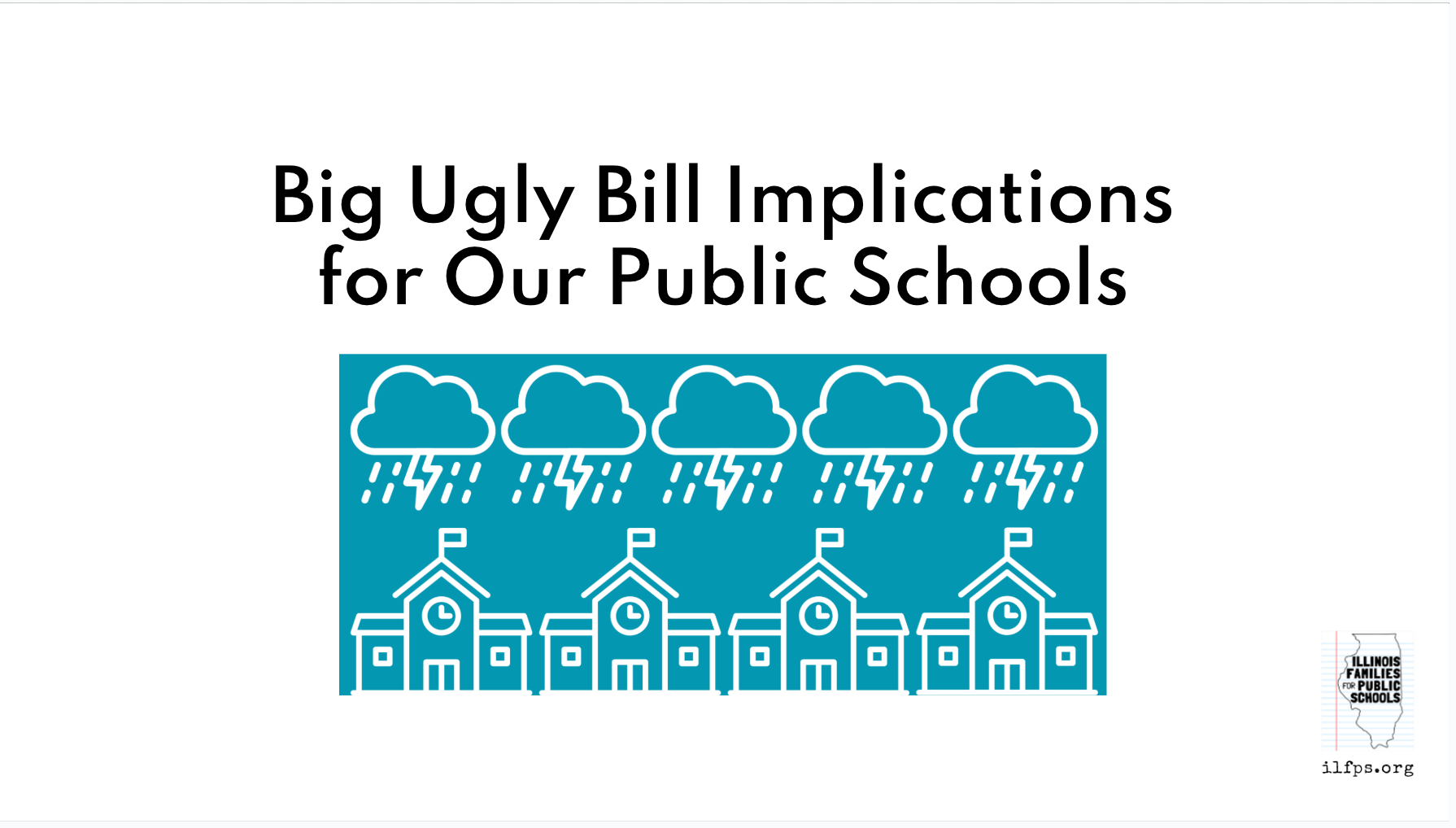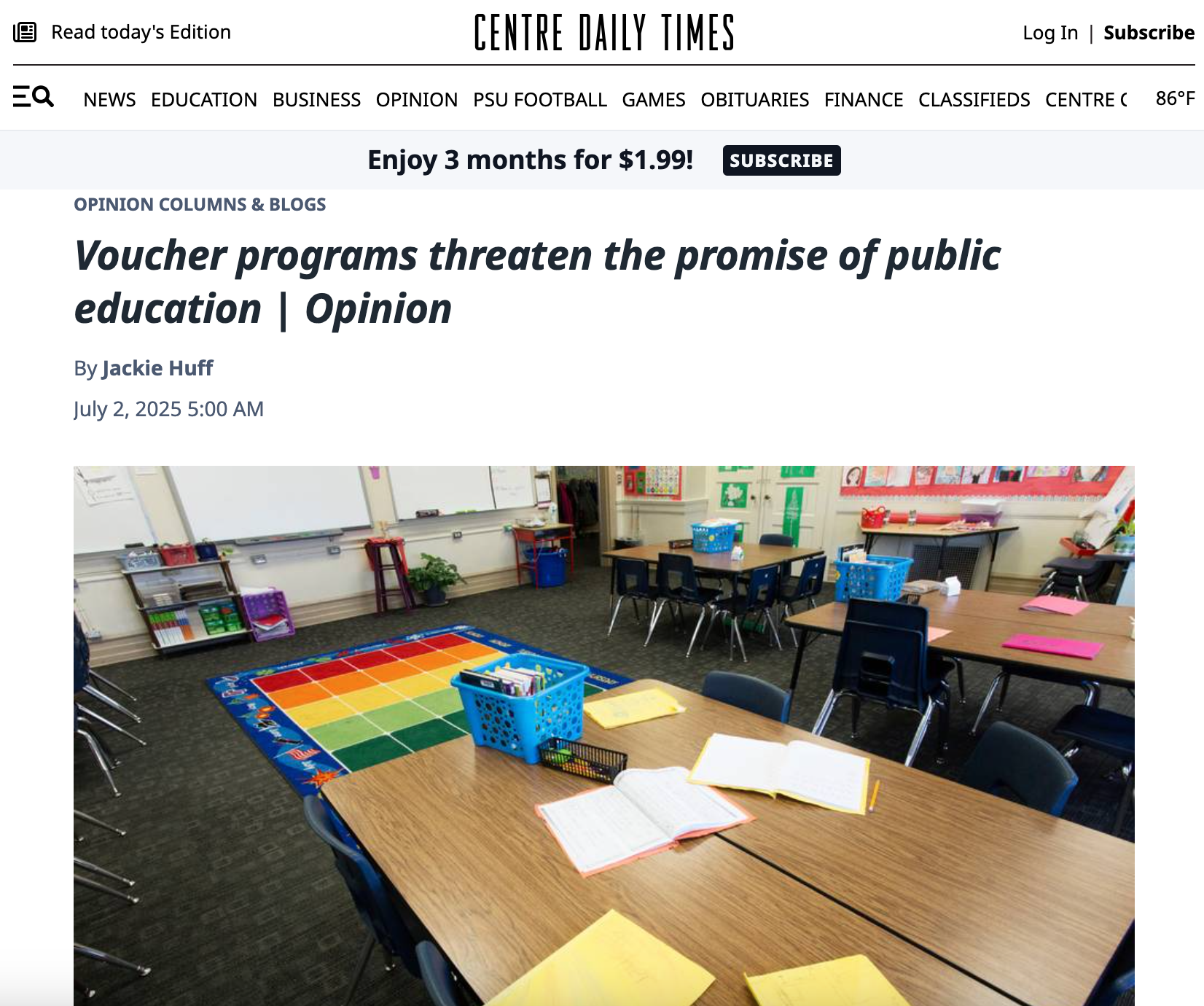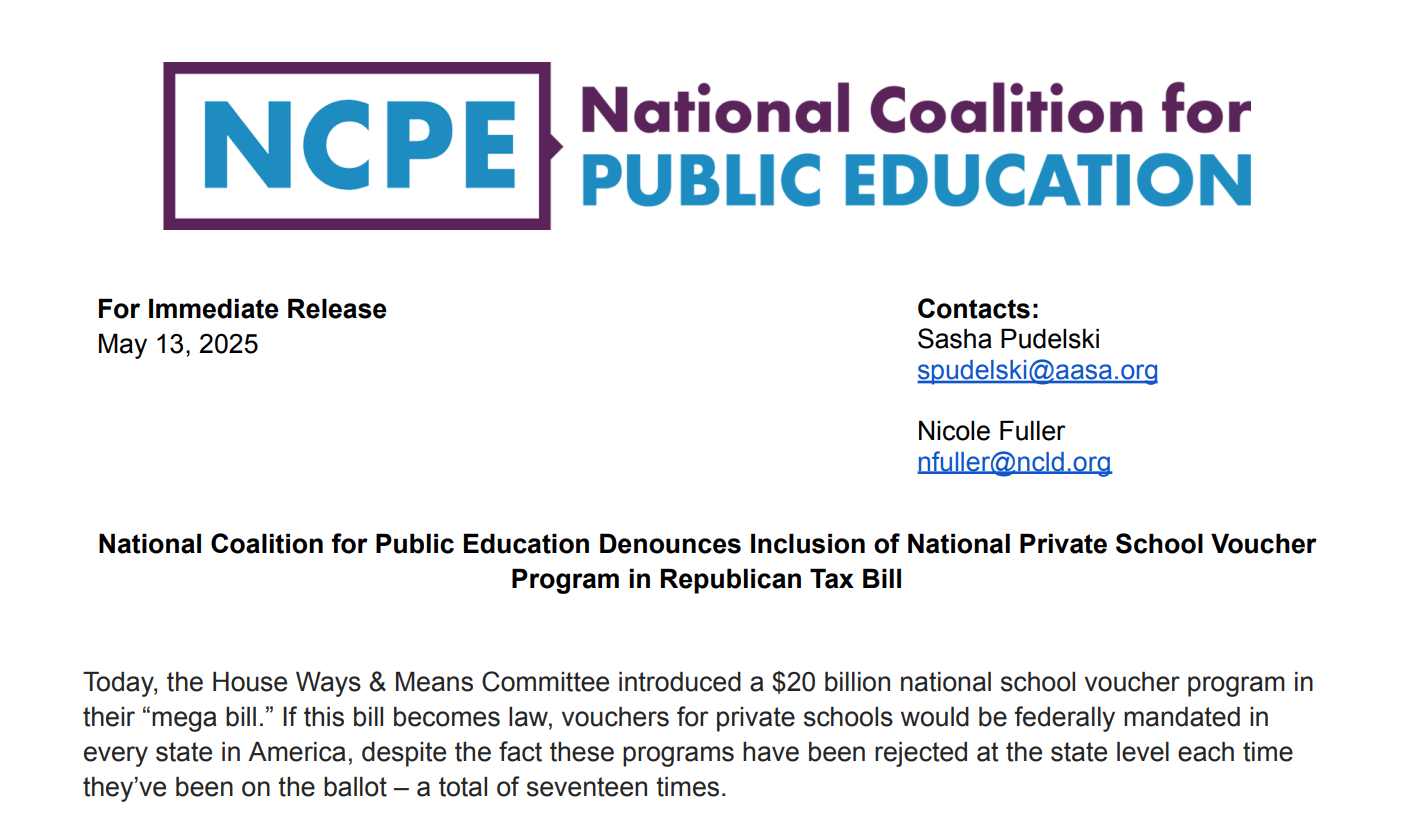ALL RESOURCES
FILTER BY TAG
Select a tag
- Academic performance
- Accessibility
- Accountability
- Advocacy
- Advocates
- Article
- Bill analysis
- Bill tracker
- Billionaires
- Blog post
- Civil rights
- Coalition building
- Community Schools
- Cost impact analysis
- Dark Money
- Data
- Disability
- Discrimination
- Drain funds from public education
- Education Savings Account (ESA)
- English language learners
- Fact sheet
- Fraud Waste and Abuse
- Graphic
- History
- Indigenous and Native Education
- Integration
- LGBTQ+
- Legislation
- Letter
- Litigation
- Messaging or talking points
- Model legislation
- National Voucher
- News
- Parents
- Personal narrative
- Podcast
- Policy brief
- Policymakers
- Radio
- Referendum
- Religion
- Report
- Rural communities
- Segregation
- Separation of church and state
- Slide deck
- Slides
- State Constitutional Right to Education
FILTER BY AUTHOR
Select an author
- Aaron Sanderford
- Alec MacGillis
- Allen Pratt
- Associated Press
- Bob Peterson
- Bruce Schreiner
- Catherine Caruso
- David Montgomery
- David Pepper
- Eli Hager
- Emily Walkenhorst
- Ethan Dewitt
- Geoff Mulvihill
- Hilary Wething
- Howard Fischer
- Jason Bailey
- Jessica Corbett
- Jim Collier
- Joe Dana
- Joshua Cowen
- Juan Perez Jr.
- Kiera Butler
- Laura Pappano
- Liam Amick
- Maurice Cunnningham
- Nora De La Cour
- Paige Masten
- Patrick Darrington
- Paul Hammel
- Phil Williams
- Rob Boston
- Robert Huber
- Rowan Moore Geretsy
- Sasha Pudelski

Federal Voucher Program – FAQs
The expansion of private school vouchers through the inclusion of a federal voucher scheme in the budget reconciliation bill passed in July is part of a broader assault on public education designed to privatize one of the most important common goods underpinning American democracy. Opting in to the federal program (the state’s choice), even to use voucher money for public education students, broadly endangers public education and opens the door to further voucher expansion, whether vouchers are already available in a given state or not.

Big Ugly Bill Implications for Our Public Schools
These slides summarize the impact of the national voucher program and cuts to SNAP/Medicaid in the Trump administration's budget reconciliation bill.

States Must Reject Harmful Voucher Program
The federal voucher program contained in the budget reconciliation bill passed in early July will divert federal tax dollars from the U.S. Treasury and from services, including public education, that Americans rely on, to give to private and religious schools that pick and choose whom they educate and openly discriminate against some students and families.

Trump’s ‘Big Beautiful Bill’ Will Devastate Public Schools. America’s Kids Will Pay the Price
This week, Republican lawmakers are attempting to pass a budget reconciliation bill that pays for unprecedented handouts to the wealthiest Americans on the backs of cuts to programs that benefit most people. Hidden in this budget package before the House is a national private school voucher program funded through tax breaks for the wealthy that threatens to dismantle our system of public schools.

Directional Signals: A New Analysis of the Evolving Private School Choice Landscape
Three years ago, Arizona became the first state to allow all students—regardless of income or need—to use public dollars for private school tuition and other educational expenses. The move marked a sweeping shift in the scale and scope of school choice in the United States.

Scamming Our Schools: Robbing Our Students’ Futures to Line Their Pockets
Senator Mazie K. Hirono (D-HI) led a spotlight forum focused on the harmful consequences the Republicans’ “Big Beautiful Bill” will have on students, parents, teachers, and schools across the country. Specifically, the forum highlights the school voucher-related provisions from the bill, which would divert billions of dollars in taxpayer funding to create the first ever national school voucher program.

Voucher programs threaten the promise of public education
Today, we face a troubling trend. The push for voucher programs that redirect public funds to private schools threatens to abandon the fundamental promise of public education. While these programs sound appealing on the surface, they risk dismantling the very foundation that makes American education a beacon of opportunity for all.

Judge rules Ohio’s EdChoice private school voucher program unconstitutional
A Franklin County judge has ruled that Ohio’s EdChoice school voucher programs are unconstitutional, delivering a victory to public school advocates and setting the stage for a likely appeal on a case over education funding in the state.

What You Need to Know About the National Private School Voucher Proposal
School vouchers allow families to use public funds to pay for their children’s private school tuition. School voucher programs enacted across the country – using tax credits, grants, and savings accounts to divert public funding to pay for private education – have consistently demonstrated that states with voucher programs tend to expand the programs over time. These expansions dramatically increase the amount of public funds diverted to private education while state investments in public education remain stagnant or decrease. Despite the numerous negative consequences of using publicly funded vouchers to pay for K-12 private education expenses,1 policy makers across the country continue to propose similar programs.

Parents and Allies Oppose National Private School Voucher Program
Policymakers join parents, students, educators and allies to discuss how the national private school voucher program in the budget reconciliation bill would shift resources from public schools to wealthy people and private schools.

Trump and Republicans Want Taxpayers to Fund Their Pet Project: Private Schools
When is a “school choice” proposal not really about school choice? In the budget bill that Republicans rushed through the House on May 12, 2025, school choice is just a cover-up for tax relief for the rich.

The School Voucher Debate – How School Choice Affects Low-Income Communities and Housing
The school choice movement, heavily supported by the Trump administration, aims to expand access to private and charter schools by redirecting public education funds through vouchers. These programs allow families to use taxpayer dollars to pay for private school tuition, but they come with serious consequences for public education, particularly in low-income and minority communities.

Advancement Project National Private School Voucher Program Opposition Letter May 30 2025
On behalf of Advancement Project and 139 national, state, and grassroots racial justice, education justice, and other civil rights organizations, we write urging you to oppose any effort to authorize or create a national private school voucher program.

The GOP House Budget Bill Also Takes Aim at Public Education with Its Private School Voucher Scheme
The GOP’s Trump-backed “big, beautiful bill” has passed out of the House of Representatives, and taxpayers are rightfully giving lots of attention to features like the slashing of Medicaid and tax cuts for the wealthy. But buried within the bill is language that would create federal education private school vouchers and provide a tax dodge for the wealthy while eroding the public school system in favor of taxpayer-subsidized discrimination.

Statement on Supreme Court Agreeing to Hear Oklahoma Case Involving Nation’s First Religious Public Charter School
Americans United for Separation of Church and State, the American Civil Liberties Union, Education Law Center, and Freedom From Religion Foundation issued the following statement concerning the petitions for certiorari granted today by the U.S. Supreme Court in Oklahoma Statewide Virtual Charter School Board v. Drummond and St. Isidore of Seville Catholic Virtual School v. Drummond. The organizations represent faith leaders, public school parents, and public education advocates in a separate lawsuit to stop Oklahoma from sponsoring and funding St. Isidore of Seville Catholic Virtual School.

About That Urban Institute Voucher Study: Q&A With Josh Cowen
The Urban Institute released a report on April 22nd that has been gaining excessive attention among advocates of private-school vouchers. In the Q&A below, National Education Policy Center director Kevin Welner asks Josh Cowen of Michigan State University to help us un- derstand that study and why there has been so much interest among folks who have other- wise been shielding their eyes from recent voucher research. Prof. Cowen was lead author of a similar study published in 2013, so we thought he would be the ideal person to comment on this new one. Cowen is the author of the 2024 book, The Privateers: How Billionaires Created a Culture War and Sold School Vouchers (Harvard Education Press).

National Coalition for Public Education Denounces Inclusion of National Private School VoucherProgram in Republican Tax Bill
Today, the House Ways & Means Committee introduced a $20 billion national school voucher program in their “mega bill.” If this bill becomes law, vouchers for private schools would be federally mandated in every state in America, despite the fact these programs have been rejected at the state level each time they’ve been on the ballot – a total of seventeen times.

Advancement Project Letter Opposing HR-833
On behalf of Advancement Project and 93 national, state, and grassroots racial justice, education justice, and other civil rights organizations, we write in opposition to H.R. 833 and S. 292, the Educational Choice for Children Act (“ECCA”), which would create a nationwide private school voucher program in the form of a 100% tax break for the wealthy.

What is the federal private school voucher program?
Social Media Graphics on the impact of the Educational Choice for Children Act.

Congress usually snubs private school choice expansion. Trump’s ‘big, beautiful bill’ embraces it.
A big Republican budget bill in Congress would establish a nationwide, federal school choice program — a potential political breakthrough that conservative lawmakers and advocates have discussed for years but which has consistently stalled.
